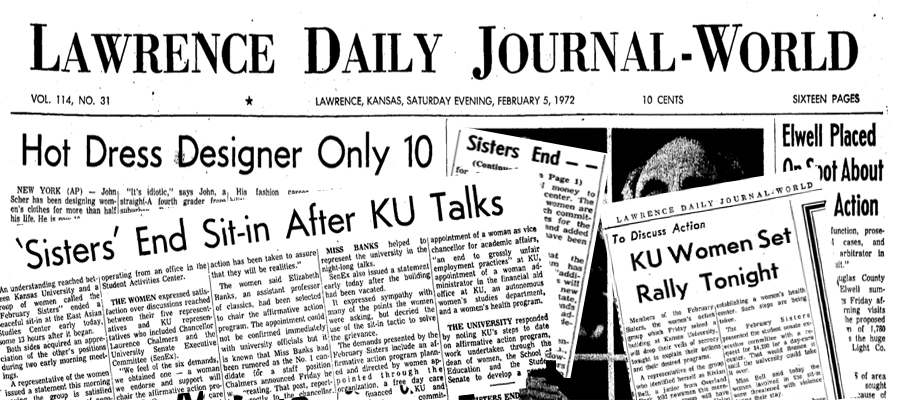They took a dramatic stand for gender equality in 1972; half a century later, the February Sisters’ legacy remains strong

photo by: KU Kenneth Spencer Research Library
A February Sisters member reads a statement on behalf of the group, which was lending its support to a group of strikers. Members of that group today said they were galvanized by more than just a handful of local issues when they occupied KU's East Asian Studies building.
In 1972, a group of about two dozen women who would come to be known as the February Sisters occupied the University of Kansas’ East Asian Studies building, demanding that gender inequality be addressed. The one-day stand, instead of fading into history, has now rippled through campus for half a century.
It’s credited with numerous changes at KU, including the establishment of Hilltop Day Care Center, the development of a women’s studies program and major, the offering of birth control pills and gynecological services at Student Health Services and the hiring of more female campus leaders, among other changes.
Christine Smith, one of the February Sisters, said that the movement at KU was mirrored across the country.

photo by: KU Kenneth Spencer Research Library
Christine Smith, pictured here with her daughter, Kirsten, in the 1970s speaks on campus.

photo by: Christine Smith
Today, February Sister Christine Smith said some of the women’s advocacy group’s demands from 1972, such as pay equity, are still issues today
“The term ‘groundswell’ really applies, I think,” Smith said. “All of this was happening, and that’s one of the reasons why we could do what we did, because other stuff was happening. If it were truly (happening in) a vacuum, I don’t know that we’d have ever bothered to get together.”
That’s something Jolene Andersen, another woman involved with the movement, also noted. Their fight came on the heels of the civil rights movement and outrage over the Vietnam War, Andersen said.
Like many of those who joined the effort, Andersen was also particularly affected at the time by a speaker who’d recently appeared on campus, feminist and women’s rights advocate Robin Morgan, whose 1970 anthology “Sisterhood is Powerful” would later be cited by the New York Public Library as “One of the 100 Most Influential Books of the 20th Century.”

photo by: Jolene Andersen
Jo Andersen, pictured here at age 70, refers to herself as the “designated babysitter” for the group that occupied KU’s East Asian Studies building 50 years ago this month.
With so much discontent over inequality, Andersen said she — and others — were angry and ready to take action.
Andersen referred to herself as the group’s “designated babysitter” for that night in 1972. She was told to prepare to care for up to 20 children whose parents were set to hunker down during the occupation for upward of two weeks. It ended up being far fewer children and was only for a night, she said, but she was thrilled that the group received so much of what it was rallying for.
For Andersen, the 50-year anniversary is an opportunity to reflect on progress in the fight for equal rights. Back then, Andersen was a preschool teacher, but she would go on to have a decades-long career in carpentry. She also spent time serving as a Lawrence city commissioner and as mayor. Andersen cited her career path as an example of how women have pushed into and balanced out more traditionally male-dominated professions, which can also be seen today in the medical and law fields. According to the Association of American Medical Colleges, slightly more than half of medical students in the U.S. are women, and the same has been true of the percentage of women in law school for a number of years.
“For me, I loved what I was doing, but also I felt like I was proving a point for all women,” Andersen said. “Yes, we can do this. Look what I built. I did that. When there’s lots and lots and lots of women doing that, it’s very hard for men to say they can’t.”
Andersen said there’s also been a lot of progress in terms of women being able to express their gender identity rather than being expected to conform to sex-based stereotypes.

Clippings from the Lawrence Daily Journal-World on Feb. 5 and 7, 1972, chronicle the February Sisters’ sit-in. Their protests helped spur the women’s movement in Lawrence in the 1970s.
The February Sisters originally issued half a dozen demands to KU, and some garnered quick results, including demands for a day care center, which was seen as vital to women fully participating in university life. Hilltop Day Care Center, now known as Hilltop Child Development Center opened later in 1972 and remains in operation. The day care center hasn’t ever been free, Smith said, but its monthly fees are on a sliding scale and don’t include profits.
Smith noted that some demands, like appointing a woman to the university’s then-vacant vice chancellor of Academic Affairs position and full health care for women at the student clinic, took longer to come to fruition. The founding of an autonomous department of women’s studies was also on the list, but Smith said that too was a more gradual process leading up to the program becoming a standard major in 1977.
Smith said she regretted that the group’s demand for pay equity within the university’s civil service system was never met. The challenge of equitable pay remains a national issue to this day, she noted.
Although the gender pay gap has narrowed since the signing of the Equal Pay Act of 1963, women still earn only 82 cents for every dollar a man earns, according to 2020 data from the Bureau of Labor Statistics.
Around the same time the February Sisters took action, Smith said developments like the passage of Title IX in 1972, protecting people from discrimination based on sex in education programs and activities, indicated national momentum for women’s rights.
The Equal Rights Amendment — a proposal that would have enshrined equality for women in the U.S. Constitution — made headway around the same time the February Sisters were organizing. The ERA was approved by the U.S. House of Representatives in 1971 and by the U.S. Senate in 1972, but it has never won the necessary 38 ratifications by state legislatures.
A year after the February Sisters made their stand, the Roe v. Wade decision legalizing abortion was handed down by the U.S. Supreme Court. That decision, heralded for nearly half a century as a landmark in the women’s rights movement, is now at risk of being overturned, many believe, with the advent of an increasingly conservative court.
•••
Looking at KU’s campus today, the Women’s Studies Department — now known as the Department of Women, Gender and Sexuality Studies — might be the most obvious example of how the February Sisters’ efforts came to fruition over time. Professor Ann Schofield was the department’s first hire, beginning her work in 1980, and she remained there for nearly 40 years until her retirement in 2019.
Schofield was able to see the department’s growth from its start to the present.
“(My hiring) was an acknowledgement on the part of the administration, on the part of the university, that this is a genuine field, we see a future in it, we have tenure track faculty in it,” Schofield said.
The department grew from single course listings to a program, then a standard major. Another milestone, Schofield said, was the department’s shift from encompassing just women’s studies to women, gender and sexuality studies. Eventually, the department began to offer graduate programs.
Schofield said that for her the February Sisters’ impact is clear. It has been somewhat like a “light board in the theater,” Schofield said, casting a spotlight on women’s studies, then women’s health, then a women’s resource center — one after the other.
“The galvanizing is like the lights going on, and those multiple lights going on in different places,” Schofield said.

photo by: Mike Yoder
C.J. Brune, center, touches a historical marker that was unveiled Tuesday, Sept. 30, 2014, by the University of Kansas and KU Endowment honoring the women known as the February Sisters, who occupied the former East Asian Studies Building on Feb. 4, 1972, to demand equal rights, safety and justice for women at KU. From left are Marilyn Stokstad, KU distinguished professor emerita of art history, Brune, who was one of the February Sisters who occupied the building, and Elizabeth Schultz, professor emerita of English at KU, who helped deliver food to the occupiers and helped commission the marker. The marker is north of 1346 Louisiana St. near the former East Asian Studies building.
The department spearheaded by Schofield continues to evolve. Associate professor Katie Batza, the department’s first hire who wasn’t shared with another department, recently chaired a search for the department’s newest hire, whose focus will be on transgender theory and identity.
Batza said the department’s faculty and degree programs have grown significantly in the eight years she has been around.
“I think part of it is because of (Schofield’s) stewardship and because of the work of the February Sisters setting us up for a really successful growth trajectory,” Batza said.
The way Batza sees it, the February Sisters were propelled both by the feminist movement and their desire to improve the lives of all people.

photo by: University of Kansas
Katie Batza
They were scholars and activists who wanted to make the world a better place, Batza said, and they represent a “tradition” that drives the department at KU to this day.
Smith said that if she were to make a list of demands today as the February Sisters did in 1972, pay equity would still be on it, and though the group earned a local victory for child care access with Hilltop, she thinks universal access to day care remains a national issue.
Andersen added that she’s especially concerned these days with the rise in “white male supremacy” cloaked in “religious freedom,” and a continued cultural focus on male-centered language — for example, using words like “chairman” for men and “chairperson” for everyone else — rather than using more gender-neutral terms.
“Progress does not happen in leaps,” Andersen said. “It happens in steps, and then steps backwards, and then steps forward. Right now, we’re in a step backwards. I’m appalled by the … censorship of school libraries. Some of that is anti-women, also.”
Smith said that over the decades she has also valued the sense of community that the February Sisters gave rise to.
“I enjoyed the movement,” Smith said. “I enjoyed the movement people. They were family, and we were all working together for something we knew was right.”
To celebrate the milestone anniversary, KU plans to host four panels across two weeks in April, all of them from 6:30 to 8 p.m.:
• “Celebrating 50 Years of the February Sisters at KU,” featuring the February Sisters, is set for Tuesday, April 5, in the Centennial Room at the KU Memorial Union.
• “Listening to All Voices: Women & Politics” — featuring former U.S. Secretary of Health and Human Services and former Kansas Gov. Kathleen Sebelius, Kansas Rep. Barbara Ballard and others — will take place Thursday, April 7, at the Lawrence Public Library auditorium.
• “We Demand: The Call for Healthcare, Childcare, Affirmative Action & Leadership Reforms at KU” will take place Tuesday, April 12, in the Centennial Room at the KU Memorial Union.
• “50 Years Later: Current Student Activism at KU” will take place Thursday, April 14, in the Centennial Room at the KU Memorial Union.







